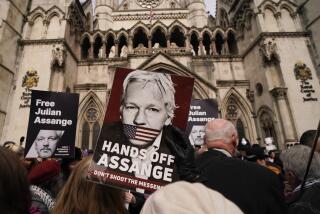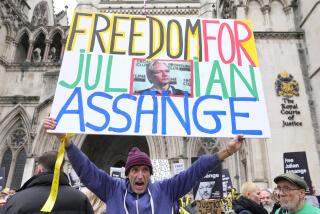British judges criticize U.S. ‘threat’
- Share via
LONDON — Two of Britain’s most senior judges accused the United States on Wednesday of having threatened to withhold intelligence from the British government if it released information about the alleged torture of a terrorism suspect currently being held at Guantanamo Bay, Cuba.
Binyam Mohammed, an Ethiopian resident of Britain, has alleged that he was tortured during interrogations by American, British and Pakistani security agents after being detained in Pakistan in 2002. His lawyers say Mohammed was taken by U.S. authorities to Morocco and Afghanistan in a so-called extraordinary rendition for questioning and subjected to inhumane treatment, including threats of sexual mutilation.
Attorneys for a group of news organizations demanded publication of a brief summary of what allegedly happened to Mohammed while in American custody, based on U.S. documents given to the British government. British officials argued against the summary’s release on the grounds of national security.
On Wednesday, the high court sided with the government, upholding its duty to keep the nation safe. But the two justices who issued the ruling accused the administration of former President Bush of pressuring the British government to keep mum through diplomatic arm-twisting.
The judges expressed dismay that “there would be made a threat of the gravity of the kind made by the United States government, that it would reconsider its intelligence-sharing relationship” with Britain, one of its closest allies, if the British government made the summary public.
Such a reassessment could “inflict on the citizens of the United Kingdom a very considerable increase in the dangers they face at a time when a serious terrorist threat” remains, the ruling said.
Human rights and civil liberties advocates immediately accused the U.S. of having tried to bully the British government and the courts.
“The judges used the word ‘threat’ eight times,” said one of Mohammed’s attorneys, Clive Stafford Smith of the human rights group Reprieve. “That’s a criminal offense right there. That’s called blackmail. Only the Mafia have done that sort of stuff.”
British officials played down the alleged threat, saying that confidentiality between governments was both imperative and routine in intelligence work and issues of national security.
“Matters regarded as secret by one government should be treated as secret by others. For it to be called into question would pose a serious and real risk to continuing close intelligence-sharing with any government,” Reuters news service quoted the British Foreign Office as saying.
In Washington, State Department spokesman Robert Wood declined to comment on the judges’ statement during a briefing with reporters, saying, “It’s the first I’ve heard of it.”
Mohammed was accused of having trained in Al Qaeda camps and participating in an alleged plot to detonate a “dirty bomb” in the United States.
But he maintained that information was extracted from him through torture, by interrogators -- including U.S. agents -- who beat him, deprived him of sleep and cut his genitals with a scalpel. The Pentagon dropped all charges against him in October.
It was unclear how President Obama’s disavowal of the prison at Guantanamo Bay might affect Mohammed’s case and the demand to have the 25-line summary of his treatment made public.
While bowing to the British government’s resistance to releasing the summary, the justices concluded their ruling by urging Obama to rethink the block on information “so important to the rule of law, free speech and democratic accountability.”
“It must now be for the United States government to consider changing its position or itself putting that information into the public domain,” the judges wrote.
--
More to Read
Sign up for Essential California
The most important California stories and recommendations in your inbox every morning.
You may occasionally receive promotional content from the Los Angeles Times.














